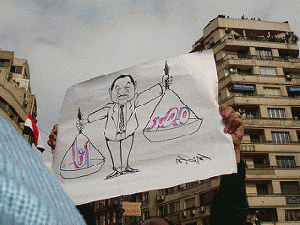Strange how intellectual discussion concerning the so-called "Arab Spring" has almost entirely shifted in recent years - from one concerning freedom, justice, democracy and rights in general, into a political wrangle between various antagonist camps.
The people, who revolted across various Arab countries are now marginalized in this discussion, and are only used as fodders -- killers and victims -- in a war seemingly without end.
But how did it all go so wrong?
There was once a time when things were so simple, so easy to understand and explain: People, who were long oppressed, revolted against their oppressors (Arab regimes) and benefactors (western powers).
Unable to effect change using peaceful channels - for Arab civil societies either did not exist or were tightly controlled - Arab masses took to the streets, each nation with a unique struggle of its own yet united around a set of basic demands.
In fact, in the early months of 2011, Arabs united briefly. A sense of nationhood emerged, from the blood and dust of revolutions, where Arab masses attempted, at least symbolically, to define who they are as nations first, and then their larger identity as Arabs.
It all started with "Al-Shaab yurid isqat al-nitham" - 'the people want the overthrow of the regime!' That much was clear. Hate for oppressive, authoritarian regimes that stifled freedoms and deprived the people from their countries' wealth and natural resources was the unmistakable priority, which was often reduced to the term 'Irhall', meaning 'Leave.'
'Irhall' was beyond empowering. Imagine, millions of poor people standing in the main squares of their cities, some in tattered clothes, others hungry, fatigued, teetering between hope and despair, all chanting at once in a thundering voice: "Irahal!" -- just 'Leave'. And they, the dictators, began leaving, one after the other.
Emboldened by their ability to effect real change, the narrative of the Arab revolutions evolved and matured. Symbols of Arab unity -- attempting to unify a common Arab goal -- began taking shape, where Tunisia, Cairo and Sana'a raised the same flags and articulated, more or less the same demands.
Symbols of unity between Christians and Muslims also began to transpire, despite attempts by regimes to sow the seeds of division. This was demonstrated more in Egypt, but other societies reflected on their unity as well, challenging tribalism, regionalism, sectarianism, and all the divisive 'isms' that crippled Arab nations for generations.
With time, other narratives also came to the fore, expressing deep-seated grievances and injustices, ranging from women's rights to access to education and the equal distribution of wealth.
The ultimate evolution of popular Arab revolutionary narrative was accentuated in the Egyptian slogan: 'khubz, hurriyah, 'adala igtimayiah' -- 'Bread, Freedom, Social Justice.'
Through that phase of the "Arab Spring", television debates, newspaper articles and social media discussions labored to match the narratives imposed by the Arab collective, who chanted and protested long enough to place their agenda on everyone one. And the media took notice, as its own narrative also evolved from 'regime change', to general references to 'freedom', 'democracy' and finally to 'development' -- all becoming Arabic buzzwords throughout national and pan-Arab media.
Things were rather simple then, if not a tad naà �ve, as well. The general assumption was that, once Egypt's Tahrir Square was cleared of the evidence of revolution and Libya was cleansed of the war machinery and ordnances (for, thanks to NATO, a regional uprising in Libya morphed into a most deadly war), the countdown for a lasting democracy and economic development would begin to take shape.
(Note: You can view every article as one long page if you sign up as an Advocate Member, or higher).





